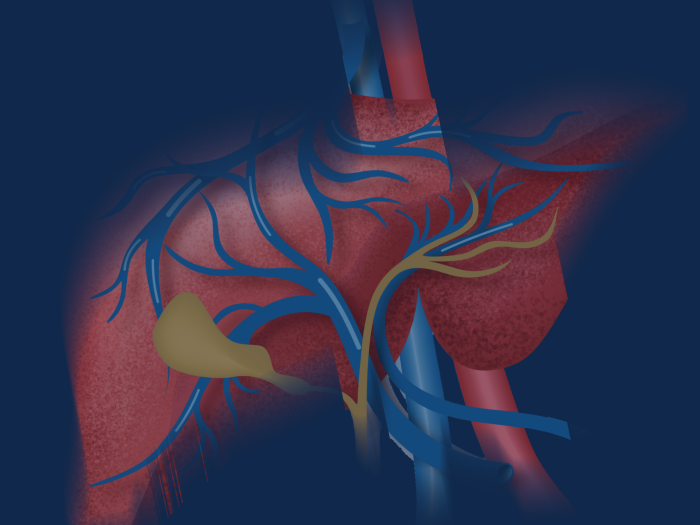-
Allergy & Clinical Immunology -
Cardiovascular Medicine -
Gastroenterology & Hepatology -
General Medicine -
Genetic Medicine -
Geriatric & Palliative Medicine -
Hematology & Oncology -
Hospital Medicine -
Infectious Diseases -
Metabolism, Endocrinology & Diabetes -
Nephrology -
Pulmonary & Critical Care Medicine -
Rheumatology

The U-M Medical School Division of Hospital Medicine is at the forefront of reforming health care and bridging the gap between theory and practice, transforming the landscape to improve efficiency, effectiveness, and quality of care and safety for patients. We proudly embrace our role as architects of a healthier future, dedicating ourselves to the dual mission of treating patients and advancing the field of health care.
Our unwavering focus on training, education, and mentorship ensures that the next generation of hospital medicine researchers have the knowledge and skills they need to drive innovation and contribute significantly to our scientific endeavors.
Our researchers conduct cutting-edge research in implementation science, health care delivery and quality outcomes, basic science, and global health. In the 2024 fiscal year, our division received over $2.1 million in federal, industry, and foundation funding to support our research activities, including grants from the National Heart, Lung, and Blood Institute, National Institute of Nursing Research, and the Agency for Healthcare Research and Quality.
Diagnostic Safety and Quality Optimization in Sepsis
The Diagnostic Safety and Quality Optimization in Sepsis study is a multi-site study funded by the Agency for Health Care Research and Quality (AHRQ), which aims to improve the safety and quality of early sepsis diagnosis using principles and tools of safety and implementation sciences.
The study will conduct electronic surveys and in-depth interviews with organizational stakeholders from each hospital to collect barriers and facilitators of acute sepsis diagnosis. The retrospective sepsis data will be collected from electronic medical records of 20 hospitals located in different sites.
An organizational toolkit will be designed and disseminated to hospitals to guide implementation or maintenance of strategies aligned with organizational context to improve or sustain optimal sepsis diagnosis. The study will then evaluate the usability and utility of toolkit in sepsis diagnosis.
Project Period: 5 years
Funded by: Agency for Health Research and Quality
Sepsis Observational Data Project
The sepsis observational data project aims to evaluate outcomes for patients and the delivery of care they receive across Michigan Medicine using retrospective health care data to answer questions about infectious diseases, sepsis and their treatment.
Effective Primary Care Practices that Enhance Recovery Trajectories after Pneumonia (EXPERT)
The overarching goal of our work is to improve patient outcomes after pneumonia. The objective of this EXPERT study is to apply a novel strengths-based approach for transformational change to refine an intervention that helps primary care providers promote the recovery of pneumonia survivors.
The study will conduct quantitative analysis of electronic medical record data to identify and refine candidate components for a primary care intervention to improve post-pneumonia care and qualitative interviews with expert primary care clinicians and patients to identify enablers and barriers for the post-pneumonia intervention.
Funded by: NIH-National Heart, Lung, and Blood Institute
Impact of Using Bedside Mobility Assessment Tool on Clinical Outcomes in the Inpatient Setting
The Bedside Mobility Assessment Tool (BMAT) was developed to help nurses improve patient mobility in an acute setting. It has been used to inform nursing plans that promote safe patient mobilization during hospitalization.
The purpose of this BMAT study is to evaluate if the use of BMAT on hospitalized older adult (≥65 years) patients is associated with improvements in clinical quality and efficiency outcomes, such as utilization of physical therapy consultation, length of stay, and the occurrence of falls, hospital-acquired pressure injury, and 15-day readmission. The study will collect pre- and post-intervention data retrospectively from patients’ electronic medical records.
PI: Linda Wang, MD
Medicine Procedure Services Study
The Medicine Procedure Services (MPS) study is an observational cohort study which aims to understand the current clinical practice around these minor procedures (thoracentesis, paracentesis, and lumbar puncture) by describing patient and provider characteristics, and assessing relevant clinical and efficiency outcomes. Data are collected retrospectively through abstraction from patients’ electronic medical records.
The study will help appraise current practice and guide quality improvement efforts regarding the performance of minor medical procedures in the hospital setting.
A Pre-Post Study to Evaluate the Feasibility of Criteria-Based Discharge Communication (CBDC) Project Intervention
The purpose of the Criteria-Based Discharge Communication (CBDC) study is to evaluate the feasibility, acceptability, and usefulness of CBDC intervention. Physicians usually communicate with patients and families about discharge in a time-based fashion rather than in a criteria-based fashion. Preliminary and anecdotal data indicate that when physicians communicate with patients in a criteria-based fashion, shared expectations result in what must be and can reasonably be accomplished while inpatient and communication and patient satisfaction are improved.
The study will collect data from both patients and providers during pre- and post-implementation period. Additionally, the retrospective data will be collected from patients’ electronic medical charts.
PI: Julieann Grant, MD
Priority Discharge Study
The Priority Discharge study aims to understand the key effectiveness/driving components of the priority discharge intervention.
The study uses a structured analysis of qualitative and quantitative data combined with a scoping review of priority discharge (PD) literature to identify core functions and forms of PD programs. The study conducts surveys with stakeholders involved in the PD program and performs scoping review of the PD program described in the literature to identify additional intervention data that may differ from our local context.
Data will be summarized to develop PD functions and form a matrix displaying a range of interventions that can support effective implementation of programs in diverse clinical settings.
Assessing Older Adult Patients' Perspectives on Mobility and Preparedness for Mobile App-Based Interventions (MAP)
This study aims to identify patient perspectives including knowledge, attitudes, and behaviors/practice in hospital-associated deconditioning. The study aims to also assess digital literacy including comfort level using mobile devices in general and for health-related content. The study will conduct an electronic survey with hospitalized patients ≥ 65 years old.
Development and Feasibility of Mobile App (MoveRx)
This study aims to develop, test, and implement a mobile device application (MoveRx) to prevent hospital-associated deconditioning. MoveRx will be designed to prompt and encourage patients to perform physical activities during hospitalization without creating a significant additional tasking burden on the health care team.
MoveRx will direct patients to perform individualized activities that are appropriate for their mobility level (assessed using AM-PAC 6 clicks and John Hopkins Highest Level of Mobility Scale). Patients will use their personal smartphone device with MoveRx installed. MoveRx notifications will remind the patient to complete three periods of ambulation activity per day, which provides a stimulus for behavioral regulation (choosing to be active) with a focus on maintaining strength of lower extremities. Patient ambulation goals will be based on Johns Hopkins Mobility Goal Calculator. This tool establishes an algorithm approach to setting daily mobility goals based on mobility limitation assessments.
Evaluating the Effects of Implementing AM-PAC “6-clicks” and JH-HLM on Hospital-Associated Deconditioning (MI-HAD)
This is a retrospective observational study that aims to identify patterns and predictors of hospital-associated deconditioning. Hospitalization-associated disability manifests as the loss of ability to complete one of the basic ADLs needed to live independently without assistance: bathing, dressing, rising from bed or a chair, using the toilet, eating, or walking across a room.
The study will also assess the implementation of standardized nursing assessments of patient mobility (AM-PAC 6 clicks and JH-HLM) at Michigan Medicine University Hospital by measuring compliance rates at each nursing unit and compare high-performing units (units in the highest tertile of compliance) and low-performing units (units in the lowest tertile of compliance) by patient characteristics and unit structural and functional characteristics.
Tailoring a Physical Activity Behavior Nudge to Reduce Hospital-Acquired Deconditioning and Frailty Among Older Women
This study will address the unique barriers to physical activity for older hospitalized women. The studies aims include:
- Assessing unique barriers to capability, opportunity, and motivation for adequate physical activity during hospitalization for older adult women, from women patients themselves and their clinical care teams.
- Incorporating findings into the initial prototype of the MoveRx mobilization nudge tool so that it is tailored to be effective for older women, and further develop/refine the tool alongside women patients and clinician stakeholders through an iterative participatory design process.
- Test piloting the resulting prototype, evaluating for feasibility, acceptability, usability, and potential for effectiveness.
Non-Interventional, Observational Studies Using Retrospective Health Care Data to Evaluate Outcomes Related to Delivery of Hospital Care at Home (Care@Home LHS)
This study aims to evaluate outcomes for patients and the delivery of care they receive across Michigan Medicine using retrospective health care data to answer questions about hospital care at home. Health care data will be accessed from databases which record health data on patients treated by U-M.
These data will contain protected health information (PHI) to allow for accurate data integration from different systems and will be de-identified to create the study database. All studies will be strictly retrospective and based on data collected by U-M for the purposes of clinical care. All publications will use de-identified and aggregate data to protect patient confidentiality. Survey or interview studies will follow best practices for human subject protection.
PI: Stephanie Taylor, MD, MS and Anu Goyal, MBChB
Faculty Development Needs Assessment
This study's purpose is to understand the faculty development needs from the faculty's perspective to make changes to the quality of the local faculty development program and better shape the future of faculty development. This study will conduct surveys with hospital medicine faculties from different institutions and will analyze which development activities are preferred by the faculties with the goal of improving individual faculty's clinical quality, scholarly productivity, effectiveness as educators, wellness, and professional fulfillment
PI: David Bozaan, MD
Utilizing a Logic Model to Enhance Best-Practices in Hospital Medicine Faculty Performance Evaluations
This study aims to provide a standardized approach for using a logic model to guide best-practices in hospital medicine faculty performance evaluations. The study conducted an electronic survey with hospital medicine program leaders across the country. By leveraging the logic model, we intend to:
Identify the key activities of faculty evaluation.
Identify the mechanisms of change and intervention activities necessary to produce desired outcomes.
Identify any lessons learned from hospital medicine program leaders’ implementation of faculty evaluation processes.
PI: Anu Goyal, MD
Implementation Research for Comprehensive Cardiometabolic Care in Guatemala
This research project focuses on implementing the WHO-recommended HEARTS Technical Package for Cardiovascular Disease Management in Guatemala. The aims are to identify barriers and facilitators to expanding an ongoing hypertension intervention to include diabetes and dyslipidemia, co-design an integrated treatment model using human-centered design, and evaluate its feasibility and acceptability through a mixed-methods cluster randomized pilot study.
The outcomes will inform a subsequent large-scale project to assess the effectiveness and implementation outcomes across Guatemala and other countries in Latin America.
PI: David Flood, MD
Brian Emmer Lab Research
The Brian Emmer Lab is a highly collaborative and multidisciplinary group of scientists who use modern genomic tools to functionally interrogate the molecular basis of health and disease. Areas of focus include atherosclerotic cardiovascular disease, lipoprotein metabolism, and acute lung injury and regeneration. The Emmer Lab uses a wide variety of experimental approaches with dedicated expertise in high-throughput CRISPR screening, massively parallel reporter assays, and deep mutational scanning. Learn about research in the Emmer Lab.
Utilizing Nucleic Acid Chemistry to Develop a Rapid and Universal Bacterial Identification System for Sepsis
The study team is developing a universal microbial detection system that can identify a bacterial pathogen within a few hours using PCR-based approaches. Without having prior knowledge of the infectious organism, the proposed system can determine both the identity and concentration of each pathogen in a clinical sample without the need for culturing.
Our goal is to design a system that can surpass sequencing, multiplex PCR, and MALDI-TOF in terms of speed, universality, and cost. Rapid identification of a bacterial species can dramatically reduce inappropriate antibiotic usage and help combat growing antimicrobial resistance as well as improve patient outcomes.
PI: Vishwaratn Asthana, MD, PhD
Funded by: Frankel Innovation Initiative
Using Vectorcardiography to Predict Heart Failure in Patients Following ST Elevation Myocardial Infarction
Modeling outcomes, such as onset of heart failure (HF) or mortality, in patients following ST Elevation Myocardial Infarction (STEMI) is challenging, but clinically very useful. The acute insult following a myocardial infarction and chronic degeneration seen in HF involves a similar process where a loss of cardiomyocytes and abnormal remodeling lead to pump failure. This process may alter the strength and direction of the heart’s net depolarization signal. We hypothesized that changes over time in unique parameters extracted using vectorcardiography (VCG) have the potential to predict outcomes in patients post-STEMI and could eventually be used as a non-invasive and cost-effective surveillance tool for characterizing the severity and progression of HF to guide evidence-based therapies.
The study identified 162 patients discharged from Michigan Medicine between 2016 and 2021 with a diagnosis of acute STEMI. For each patient, a single 12-lead ECG >1 week pre-STEMI and >1 week post-STEMI were collected. A set of unique VCG parameters were derived by analyzing features of the QRS complex. We used LASSO regression analysis incorporating clinical variables and VCG parameters to create a predictive model for HF, mortality, or the composite at 90, 180, and 365 days post-STEMI.
The VCG model is most predictive for HF onset at 90 days with a robust AUC. Variables from the HF model mitigating or driving risk, at a p < 0.05, were primarily parameters that assess the area swept by the depolarization vector.
PI: Vishwaratn Asthana, MD, PhD
Funded by: Frankel Cardiovascular Center (FCVC) Just Do It Award
Our faculty and staff serve as leaders and members of the following programs and initiatives:
- Michigan Hospital Medicine Safety Consortium (HMS)
The goal of the Michigan Hospital Medicine Safety Consortium is to improve the quality of care for hospitalized medical patients who are at risk for adverse events. - Patient Safety Enhancement Program (PSEP)
The Patient Safety Enhancement Program’s primary focus is on conducting and disseminating high-quality and impactful research that can be applied broadly. - VA Center for Clinical Management Research (CCMR)
The mission of the VA Center for Clinical Management Research is to advance knowledge, promote innovations and engage in collaborations that will improve the health and health care of Veterans and the nation.
Learn more about the Division of Hospital Medicine research.
Hospital Medicine Research Fellowship Program
Our division is among just a few in the nation to offer a dedicated two-year Hospital Medicine Research Fellowship Program to our faculty. The fellowship is built within the curriculum of the U-M Institute for Healthcare Policy and Innovation National Clinician Scholars Program and includes training in quantitative methods, qualitative methods, and leadership training with dedicated mentorship and support from leaders in general and hospital medicine.
JetPack Clinical Scholarship Program
“JetPack”, a scholarship program created by the Division of Hospital Medicine, is aimed specifically at clinicians interested in quality improvement or operational efforts. The purpose of JetPack is to provide peer-to-peer mentoring within a resource rich environment to help mentees succeed, typically junior faculty with little experience in conducting or writing a research/QI project. It is designed to help hospital medicine faculty pursue academic work that will lead to the publication of a peer-reviewed paper.
Michigan Acute Care Embedded Scholar (M-ACES) Program
Michigan Acute Care Embedded Scholar (M-ACES) Program is an initiative designed to support early-career investigators within the Division of Hospital Medicine to advance their research careers. M-ACES is open to all faculty and staff and aims to support and enhance research skills, foster innovation, and provide a clear pathway to career advancement in the research domain. By the end of the program, scholars will possess the skills needed to conduct research independently and contribute to impactful research projects.


